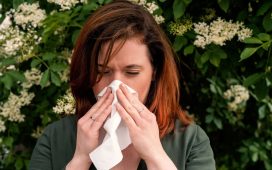Being healthy should be a lifelong commitment, but it becomes more pressing when people reach their 50s.
Genetics plays a role, but people’s behaviors and attitudes can also influence how well someone ages.
Aging well means more than just being physically healthy, Dr Theresa Allison, a geriatrician and professor of medicine at the University of California, San Francisco, said.
The American Association of Retired Persons (AARP) has devised a checklist for people in their 50s to see if they are aging gracefully based on the latest science.

1. You have strong social connections
Older adults are more at risk of loneliness caused by living alone, no longer working, and being less mobile.
A National Academies of Sciences, Engineering and Medicine report found that more than a third of adults aged 45 and older are lonely, and a quarter of adults 65 and over are socially isolated.
In May, the US surgeon general warned that loneliness was a public health crisis in America, highlighting that social isolation is linked to a higher risk of heart disease, stroke, diabetes, depression and dementia.
Research shows that people with a strong support system are happier, healthier and live longer.
A review of 148 studies found that people with deep social connections increased their chances of survival by 50 percent.
Dr Allison said: ‘There’s nothing wrong with being an introvert and with liking living alone.

Having strong social connections is a key pillar for a long life
‘We’re not all extroverts, but we are humans. None of us is an island, and we do need each other in different ways.’
The AARP advised that those living alone should aim to reach out to at least one friend or family member daily.
Keeping in touch with people is particularly important as people reach retirement and no longer have access to a ready-made social circle of colleagues at work.
2. You are physically active
People who are physically active and have exercise naturally incorporated into their lives are more likely to age well, said Dr James Powers, an associate professor of medicine and practicing geriatrician at Vanderbilt University Medical Center.
This could be gardening, walking or playing pickleball.
It doesn’t just keep your muscles, joints and heart healthy.
It can also boost your mood and help ward off chronic illness, including dementia, diabetes and heart disease, as well as increase your life expectancy.
A study in 2022 of more than 5,000 senior women found that physical activity was connected to a lower risk of death, even in those who are deemed unlikely to live a long time based on their genetics.
The study also found that lengthy periods spent sitting can raise your risk of death.
The AARP recommended half an hour of exercise five days a week but said that any physical activity at all can help make a difference.
Dr Powers emphasized doing something you enjoy and said: ‘If you don’t enjoy it, you’re not going to stick to it.’
He proposed getting in your exercise with a friend to increase accountability and make it more fun.
‘The buddy system really works,’ he said.
3. You follow a Mediterranean diet
A huge amount of research has designated the Mediterranean diet as the gold standard eating regime.
It involves mainly vegetables, fruits, whole grains and healthy fats.

A huge amount of research has designated the Mediterranean diet as the gold-standard eating regime
A study published last year found that swapping to a Mediterranean diet from the normal Western diet can help you live longer, and the earlier in your life you start, the better.
But even if you don’t start eating the Mediterranean diet until age 60, you can expect to live an additional eight years, the study found.
And adopting the diet at age 80 still boots life expectance by around three years.
4. You take part in meaningful activities
Research shows that people aged 50 and over who have a sense of purpose are in better spirits and live longer.
A study published in 2019 in JAMA Network Open of almost 7,000 adults found that those who scored highest on a scale measuring ‘life purpose’ were less likely to die across four years than those who scored lower.
Experts believe taking part in activities that matter to you may reduce your stress level, lessening inflammation in the body, which is associated with health problems such as cardiovascular disease.
Dr Allison: ‘When I look at older adults who are living alone who are living rich, meaningful lives, they are doing the things that reflect their values and their identities.’
Dr Allison, who is in her 50s, said she recently began relearning the flute and joined a flute choir in San Francisco.
She said: ‘Suddenly, I have to go someplace new. I have to learn new music, and we know that learning new things is important as we grow older.
‘I’m meeting new people. And I’m engaged in a community activity that results in community service, because at the end of this we’re giving a free concert. So it pulls everything together.’
Dr Allison suggested figuring out what is important to you and what you enjoy doing and then putting time aside for it in your routine.
5. You sleep for at least seven hours a night
Sleep is an incredibly important part of aging well, and not getting enough can heighten your chances of conditions such as obesity, diabetes, depression, high blood pressure and heart disease.
Research also draws a link between time spent sleeping and the risk of dementia and even death.

Not getting enough sleep can heighten your chances of conditions such as obesity, diabetes, depression, high blood pressure and heart disease
Sleep offers the body time to get rid of toxins in the brain and fix damaged neural connections.
Neuropsychologist Dr Karen Miller, senior director of the Brain Wellness and Lifestyle Program at Pacific Neuroscience Institute in Santa Monica, California, said: ‘If we don’t have enough sleep, we don’t get that repair.
‘Think about all the good antioxidants you get from vegetables and fruits. They can’t do their job if you don’t get seven hours of sleep.’
6. You have a positive outlook
Research suggests that people who have a positive mental attitude tend to live longer and healthier lives than people with a negative outlook.
Geriatrician John Batsis, associate professor in the division of geriatric medicine at the UNC School of Medicine, said: ‘Age is just a number, but how you feel about it is so important.
‘I have folks who feel old in their mid- or late 60s. I have others in late 80s who feel young. Having a positive outlook, having things to look forward to, really promotes wellbeing and quality of life.’
Having a positive outlook on aging has been shown to reduce the risk of dementia and lengthen your lifespan by around seven and a half years, Meg Selig, a retired counselor who studied habit change for her book, Silver Sparks: Thoughts on Growing Older, Wiser, and Happier, said.
It is thought that embracing negative ageist stereotypes can become a self-fulfilling prophecy.
Ms Selig proposed looking to older people in your life who you admire and noticing positive portrayals of senior adults in the media.
7. You are conscientious
Diligent people tend to keep up with doctors’ appointments, take their medication on time and steer clear of harmful habits such as smoking.
A study of almost 2,000 people found that people who were conscientious were 22 percent less likely to become cognitively impaired.
A further study found a 35 percent lower risk of early death for conscientious people.
Some people may naturally be more diligent than others, but you can help yourself by keeping track of things in a calendar and setting reminders.
8. You are maintaining brain health
A study published in May this year suggested losing cognitive abilities may not be inevitable in old age.
The research saw adults aged 58 to 86 take three to five classes in subjects like Spanish, drawing and music composition for three months.
Halfway through the study, the participants had already boosted their brainpower to the level of adults who were 20-30 years younger.
Dr Miller said: ‘It’s the concept of use it or lose it.
‘When you learn something new, your memory center is lighting up like a Christmas light. You’re stimulating it and creating a loop of new information, and that stimulation is like a workout for the hippocampus.’










